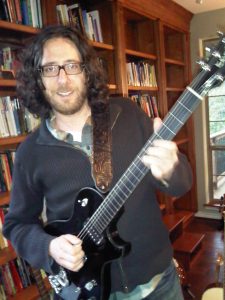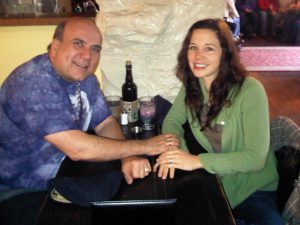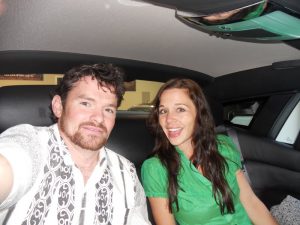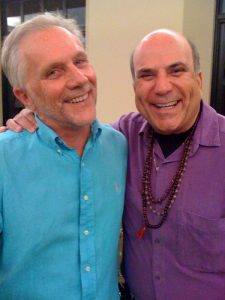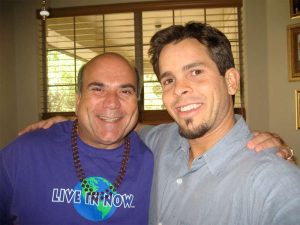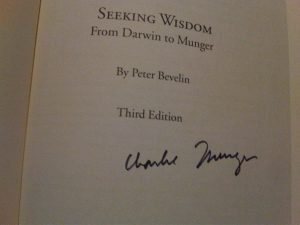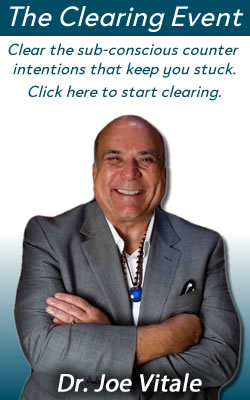Secret
Remembering Your Future Past
Recently singer Daniel Barrett of the Austin band Porterdavis came to my home for my weekly pre-production session for my forthcoming album of original music. As he walked up the stairs into my recording studio area, I started congratulating him on something he hadn’t done yet.
“Dan, it was great to see your book on the New York Times bestseller list. I felt proud to know I was a part of that process. And I’m thrilled to see that you can still make time for our lessons with all the media requests and offers you’re getting since your book hit it big time. “
Dan stood at the top of my stairs and took in what I was saying. I was using his own process on him. He was letting it sink in. He knew he hadn’t written his book yet. But he also knew I was speaking from the future, and reporting back to him what had happened.
“The reviews say your book is a breakthrough in creativity and has implications for quantum realities. Your millions of readers are loving your new process. And I loved seeing you on national television talking about it all.”
Dan introduced me to his Remembering Process at a recent lesson. I was struggling with writing my first songs. Dan said, “It’s easier to remember than to create.”
“It’s easier to remember than to create.”
He invited me to start trying to remember what my first song was all about. How it sounded. The lyrics. The melody. The chords. He wasn’t asking me to create it; he was asking me to remember it.
I started to get high on this fun process. I told Dan it felt like an advanced form of Nevillizing. In my book The Attractor Factor I invited readers to “Nevillize” a goal by pretending it had already happened. It’s what Neville Goddard taught. It’s a powerful way to implant a goal into your being.
But Dan’s “remembering” process was as if you had gone way off into the future, way past the completion of the goal, and you were now trying to remember how you accomplished it.
The first time Dan taught me his method, I couldn’t stop doing it. Our entire conversation was around, “I remember that my first song had this cool guitar lick in it.”
I’d then play the guitar lick.
I’d then stop and wonder what was next in the song.
Dan would say, “What do you remember being next?”
Obviously, there was no actual song in that moment,* yet because I was trying to remember one from the future, it egged me to be creative in a playful, curious, fun way.
And yes, I did write that first song.
And yes, it has some catchy guitar licks and hypnotic lyrics.
And yes, I loved the process of creating by remembering.
Dan is writing a book about his method. He has to, since I saw it in his future and told him I remembered it being a bestseller.
Meanwhile, I asked him to explain The Remembering Process for you. Here’s what he emailed to me:
“This process is akin to visualization. The only drawback of visualization is that once you start connecting to universal time, visualizing can almost take something “out of” your field. Wanting it suggests that you might not get it. Remembering it affirms that somewhere in the time space continuum you have had this thing for years. Eons. Really, forever since those measurements are pretty arbitrary when placed next to the other model of time.”
I explained this process to singer Sarah Marie and then demonstrated it by saying, ” I remember hearing you received an advance of one million dollars for your next music CD.”
Being a quick study, Sarah smiled and said, “Actually, it was for 1.2 million dollars.”
This blog post is the very first public sharing of this new secret to attracting what you want. Dan gave me permission to share this with you.
I suggest you play with this.
Whatever your next goal or intention happens to be, imagine it’s done and you’re way past it in time.
What you do next is remember the thrill of accomplishing it.
And from there you can play with remembering how you accomplished it.
In another email, Dan added this thought to help explain the Remembering Process:
“They say that Michelangelo felt he ‘freed’ the David from the stone. Somewhere in the time/space continuum, that sculpture was complete and finished. He remembered the form, and allowed it to enter it’s new life.”
I remember how much you loved this process.
I remember that you used the process a lot, and bought Dan’s book when it came out, and loved it.
Remember?
Ao Akua,
PS – Daniel is in the award-winning band Porterdavis. I remember you checked them out and loved their music, too.
* Or was there?
Benevolent Outcomes
Tom Moore wrote a couple of cool books that are helping me fine-tune my intentions these days.
The Gentle Way and The Gentle Way II are “self-help guides for those who believe in angels.”
I love the niche of the titles: if you don’t believe in angels, pass up these books. But I don’t think believing in angels is crucial to using the method Moore describes.
In short, he suggests that you ask for a “benevolent outcome” for whatever you are about to do or request.
For example, I might say, “I ask for the most benevolent outcome in writing this blog post.”
Or you might say, “I ask for the most benevolent outcome in meeting with my potential new employer.”
There are many ways to word these requests, but basically the phrase “benevolent outcome” is key.
“Benevolent” means, in my own words, highest good. So you’re asking for the highest possible good to come out of whatever you are doing or requesting. (My favorite word is “benestrophe” which is many good things happening at once; the opposite of a catastrophe.)
When you’re asking for a benevolent outcome, you’re releasing your ego’s need to control the result. Yes, you still want what you request, but you’re open to something better.
There’s a freedom in using this method to set intentions. Too many requests are based in fear and desperation. Bad move. The energy hiding in such a request will either block your desired outcome or bring you something to match the feeling of desperation and fear. You don’t want either.
I wrote in my book The Attractor Factor, and in many other places, that you can have virtually whatever you want, as long as you don’t need it.
The key word is need. When you need something, you are putting life and death stress on your request.
Instead, state your request with the disclaimer that you are open to the best possible outcome, which may be something you don’t see right now. The ego has blinders. The Divine does not.
The beauty of the method Moore describes is you get to make your request and remain open to something better.
Moore wants you to ask these requests of your guardian angels. I’m all for it. I’ve been doing it just that way, too. But if angels are a stretch for you, consider that you are making the requests of your unconscious, wiser, higher, deeper mind. Either way, you get the benefit.
Here are tips from Moore on how to make these requests:
Request the Benevolent Outcomes out loud, whisper, or in writing.
Start with easy requests for immediate feedback.
Be very specific with your request.
Make requesting Benevolent Outcomes a habit.
Requesting a Benevolent Outcome with emotion and feeling reinforces the request.
Don’t be afraid to ask for the impossible.
You can request that the outcome be even more than you can expect or imagine.
Thank your Guardian Angel for fulfilling your request.
Experiment with benevolent outcomes today. Before your next call, or email, or visit, or anything, ask “I request the most benevolent outcome for…”
I am experimenting with being very specific while still letting go of attachment.
For example, I might state, “I request the most benevolent outcome with my writing songs that inspire and are fun and hit the Billboard charts.”
Moore’s books are breezy reads. They are great places to learn more about the specifics of this easy method, and to see countless examples of them in use from people like you and me. I recommend them.
Ao Akua,
PS — I don’t know Tom Moore or his guardian angel and I’m not an affiliate for his books. Get more info at his website here.
What's Really Stopping You?
Recently singer Sarah Marie kidnapped me.
If you’re going to be kidnapped, she’s the way to go.
We sometimes meet for coffee, and talk about everything from guitars and music to movies and dreams. We also “Nevillize” each others’ goals. She’s part of my support team for creating my own music, and I’m helping her produce a CD of ho’oponopono inspired, Opera-influenced healing music. I love spending time with her.
But this time Sarah said we would be going on a mysterious little trip. She didn’t offer any clues and my normal psychic powers couldn’t see in the dark.
I surrendered.
We met, got in my car, and I started driving.
And driving.
And driving.
We were going through remote wooded hilly areas that seemed perfect for UFO landings.
No sign of life.
No billboards.
No other cars.
Where was this woman taking me?
Eventually we ended up at a hidden hilltop estate. As we passed through the front gate, Sarah told me this was the home of Martin Jacobvitz, a reclusive wood worker and luthier (guitar maker), and the jolly man was going to give me a private tour of his shop and guitar collection.
Now anyone who knows me knows I love guitars. I’ve met several luthiers and always learn a lot. The fact that Sarah arranged this private meeting was a thoughtful and priceless gift to me.
But the reason I’m sharing this story with you is this: the man who makes guitars in the seclusion of his home learned how from books.
From books!
Stop and think about this.
He didn’t take courses.
He didn’t do an apprenticeship.
He didn’t worry and fret about education and experience.
He didn’t let anyone talk him out of his wild desire and dream.
Instead, he simply read books and took action.
This is a huge secret to success:
You need very little to actually go for your dreams. Most of what you say you need are excuses for not taking action right now.
Let me give you a couple more examples:
Will Arntz (pictured above) is the man behind the hit movie What the Bleep!? I recently spent an evening with him. During it he told me he had no movie making experience at all. He hired people to help him. But when the editor he hired flaked out, Will simply took over the job. He learned movie editing on the fly and edited the now famous movie.
Nick Ortner (above) is the man behind the great EFT movie The Tapping Solution. When I interviewed him, I asked what experience he had in creating movies. He said, “I had a membership card to Blockbuster.”
How could these people create globally recognized movies with no experience?
What these people have in common is desire.
And desire is all you need to get moving on your dreams.
Yes, money, resources, talent and a long list of other things would be nice to have, too.
But what do you really need?
What’s really stopping you?
I suggest the only thing in your way is lack of action.
And you are in control of that.
If you focused on your desire, and let your passion lead the way, you’d attract what you need as you need it.
Knowing this, what are you going to do today?
What’s really stopping you, anyway?
Ao Akua,
PS – I met Sarah Marie over a year ago, when she came to my local book signing for Attract Money Now and spontaneously sang for me. I expected her to sing some folk song. She didn’t. What she sang was so much more, and it fried everyone in the room, especially me. I wrote about her as “The Woman Who Sang Past Fear” here: http://blog.mrfire.com/the-woman-who-sang-past-fear/ Expect great things from her. If you missed her singing to me the first time, here it is:
How Rob Thomas Gets Inspired
I’ve yet to meet Matchbox Twenty singer and Grammy-winning songwriter Rob Thomas but I’m sure learning from his music, songwriting, and success.
In reading everything I can about this talented young man, I found a 2009 article in Keyboard magazine that made my head spin.
The real secret of Rob Thomas’ success might surprise you.
It did me.
Here it is:
Rob doesn’t wait for inspiration. He works.
Surprise!
He takes massive action, which of course is the important hidden key word in the phrase “Law of Attraction.”
Rob said “…half of art is getting out of f***ing bed and doing it.”
He said he doesn’t recall the last time he worked a 40 hour week because he works 18 hour days. (!)
He went on to explain that he often spends entire days, one after the other, trying to write a song, and turning up nothing.
But then one day a hit (such as Her Diamonds, Push, Lonely No More) is there. He admits it’s the work before the hit that enables a hit to be born.
The article quoted visual artist Chuck Close as saying, “Inspiration is for amateurs.”
Wow.
“Inspiration is for amateurs!”
Made me think of the famous Jack London (author, The Call of the Wild) quote where he said he doesn’t wait for inspiration. He lights out after it with a club.
You may be wondering how all of this flows with my own philosophy of honoring inspiration and taking action.
I love it.
What Rob Thomas is doing is inviting inspiration with his working. There may be a time or two when a whole song comes to him as a gift, all written and ready to be sung. But I doubt it.
Inspiration comes when you show up and knock on its front door with work, and then when it gives you a peek, you take it and mold it into life.
Many authors have admitted their secret to inspiration was simply sitting and typing.
Ray Bradbury said writing a story a day gave him some classic sci-fi literature.
Jack London wrote over fifty books with his work ethic of writing 1,000 words every day.
How easy is this?
Consider —
A friend misread the Jack London quote and wrote 2,000 words a day. He wrote and published a dozen books before he realized he had accidentally doubled Jack London’s discipline.
I write virtually every day, maybe not as relentlessly as Rob Thomas, but maybe I should. He’s far more famous than me, and has far more girls after him.
The point: Don’t sit around and wait for inspiration. Discover the prayer of work, which invites inspiration. Yes, you may perspire along the way, but if you’re doing what you love, you won’t care.
Let me repeat that:
When you’re doing what you love, you may “work” longer hours than anyone else, but you won’t care because you’re doing what you love.
It looks to me like the success formula of Rob Thomas is this:
1. He follows his passion. He openly says all he knows how to do is sing and write songs. He’s focused.
2. He shows up to work. He says he works 18 hour days.
3. He continues to work. He shuns the parties and distractions and continues inviting inspiration through the discipline of work.
Pretty simple, isn’t it?
Do what you love by working at it every day and your intention will meet inspiration along the way. (Hey, that sounded like a song lyric.)
Rob is so clear about his purpose that he used to identify himself at airport security as “rock star” before he was one.
Finally, there’s another quote in the same interview with Rob that I like. He said don’t be afraid to screw up. To be exact, he said…
“Dare to suck. That changes everything.”
Now get to work.
Ao Akua.
PS – If you personally know Rob Thomas, please tell him I’d like to meet. He’s been an inspiration, and several of his songs are in the jukebox in my head and won’t stop playing, which is just fine with me. I love them. He also has a movement to help homeless people, so he might want to know about Operation YES.
Bonus: Here’s Rob Thomas singing the 1999 chart-busting hit Smooth (which he co-wrote for his wife, Marisol) as Santana smokes:
Seeking Wisdom
I’m reading Peter Bevelin’s book, Seeking Wisdom: From Darwin to Munger, and having to stop every page or so to record an insight.
Within pages of starting the book, I read about how our genetics get “turned on” due to our environment. In other words, you may have genes to do any number of things, but unless they are stimulated by your surroundings, they will remain “off.”
Bevelin writes, ” So our behavior emerges from the mutually dependent activity of genetic and environmental factors.”
This is one reason your income is usually the average of the incomes of the five people closest to you. They help make up your financial environment.
It’s also why Ben Affleck’s recent movie, The Town, is about a city that appears to breed bank robbers. It’s their environment.
What can you do with this wisdom?
My suggestion (assuming you’re not getting the results you want) is to change your environment.
- That might mean rearranging your home or office, or even leaving it entirely.
- That might mean reading more success literature and more self-help material.
- That might mean attracting new friends that are already successful in your passions.
- That might mean joining associations that keep you stimulated with a focus on your goals.
The point is to surround yourself with the appropriate environmental stimulation to turn on the genes that will help you achieve your goals.
An example might be joining a fitness club or gym. I’ve noticed I work out harder and longer and more regularly when I hang around my bodybuilding friends rather than my Internet marketing friends. The first set of friends creates an environment for physical fitness; the second one creates one for online wealth. Nothing wrong with either one. But being conscious of the environment you’re typically in will help you understand the results you typically get.
I’m doing this with my music. I have several friends already successful at singing, writing music, and playing guitar. I’m spending more time with them to help “turn on” the genetics in me to excel as a musician.
One suggestion is to get into some form of coaching. By being coached you will get the stimulation and information you need to help you change. It’s part of changing your environment.
I’m enjoying Seeking Wisdom and recommend it.
Ao Akua,
PS – I’m not an affiliate for the book; nor do I know the author, let alone Darwin or Munger.

